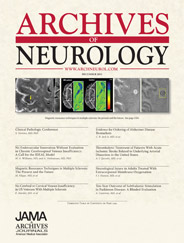美国研究人员日前在美国学术刊物《神经病学文献》网络版上报告说,一种名为脂联素的激素是女性患痴呆和早老性痴呆的潜在风险因子。

美国塔夫茨大学研究人员测量了840人血液中的一些指标,这些人中有541人为女性。测量指标包括葡萄糖、胰岛素、糖化白蛋白、C反应蛋白、磷脂酶A2以及脂联素。
在平均13年的跟踪研究中,这些人中共有159人患痴呆,其中125人患的是早老性痴呆。在调整了其他风险因素后,研究人员发现,脂联素水平较高的女性患痴呆及早老性痴呆的风险也较高。
脂联素是脂肪细胞分泌的一种激素。研究人员表示,早老性痴呆患者大脑中的胰岛素信号传递失灵,而脂联素能增强胰岛素的敏感性,理论上讲,较高的脂联素水平应当有利于阻止认知能力下降,然而数据却显示,脂联素水平升高与女性患痴呆及早老性痴呆的风险增加有关。
早老性痴呆又称阿尔茨海默氏症,是最常见的痴呆类型,患者大脑中一种淀粉状蛋白出现异常堆积,脑细胞受损,记忆能力下降。目前尚没有疗法能治愈这一疾病。

Biomarkers for Insulin Resistance and Inflammation and the Risk for All-Cause Dementia and Alzheimer Disease
Thomas M. van Himbergen, Alexa S. Beiser, Masumi Ai, Sudha Seshadri, Seiko Otokozawa, Rhoda Au, Nuntakorn Thongtang, Philip A. Wolf, Ernst J. Schaefer,
Objective To investigate the contribution of biomarkers of glucose homeostasis (adiponectin, glucose, glycated albumin, and insulin levels) and inflammation (high-sensitivity C-reactive protein and lipoprotein-associated phospholipase A2 levels) to the risk of developing Alzheimer disease (AD) and all-cause dementia.
Design Prospective cohort study.
Setting Dementia-free Framingham Heart Study participants had sera measured for these biomarkers at the 19th biennial examination (1985-1988) and were followed up prospectively for the development of AD and all-cause dementia.
Participants Eight hundred forty (541 women, median age of 76 years) subjects participated in the study.
Main Outcome Measures We used sex-pooled and sex-specific multivariable Cox proportional hazards models adjusted for age, education, body mass index, recent change in weight, APOE 4 allele status, and plasma docosahexaenoic acid levels to determine association of these biomarkers with the development of all-cause dementia and AD.
Results Over a mean follow-up period of 13 years, 159 persons developed dementia (including 125 with AD). After adjustment for other risk factors, only adiponectin in women was associated with an increased risk of all-cause dementia (hazard ratio [HR], 1.29; 95% confidence interval [CI], 1.00-1.66; P = .054) and AD (HR, 1.33; 95% CI, 1.00-1.76; P = .050) per 1-SD increase in adiponectin level. Women with baseline adiponectin values more than the median had a higher risk of all-cause dementia (HR, 1.63; 95% CI, 1.03-2.56; P = .04) and AD (HR, 1.87; 95% CI, 1.13-3.10; P = .01) as compared with those with values less than the median.
Conclusion In women, increased plasma adiponectin levels are an independent risk factor for the development of both all-cause dementia and AD.








